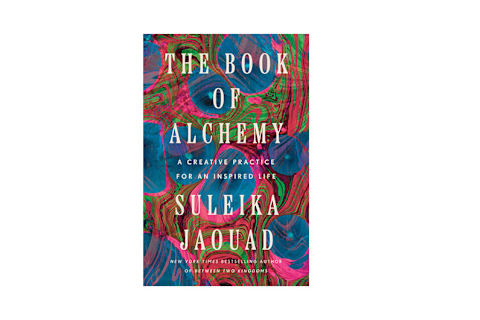Want To Lead A More Inspired Life? Your Ultimate Guide To The Art Of Journaling

Self-discovery is a journey. Finding your truest self requires you to engage with discomfort, to ask questions, and to dream daringly—and for many, the process begins in the pages of a journal. A journal offers an empty space to release your thoughts and explore your inner self without judgment. But the blank pages can just as easily cause a creative roadblock.
In the Book of Alchemy, bestselling author Suleika Jaouad delivers the ultimate guide to the act of journaling, even for those facing a lack of inspiration. Broken into 10 themed chapters about topics such as love, loss, and rebuilding, the book dives into the power of this life-altering practice to tap into our creativity. Curated with both experienced journalers and beginners in mind, the guide carefully pairs unique journaling prompts with essays from a variety of voices—including pop stars, actors, thinkers, and other writers—to help you look within.
Below, author Suleika Jaouad shares her inspiration for the Book of Alchemy in an excerpt from the book, as well as a journaling prompt. To purchase your own copy of this book, click here!

The inspiration
I've kept a journal for as long as I can remember. It has been the keeper of my memories and yearnings. I've used it to mark the biggest thresholds, to ride the roughest waves, to traverse the liminal space between no longer and not yet. It has proved essential in major life transitions, like during the many moves my family made in the early years of my childhood.
Journaling went from a favorite pastime to a lifeline when I was diagnosed with leukemia at age 22. Being confined to a hospital bed, unable to do anything unassisted—even things as basic as taking a shower—sent me into a deep depression. I was unrecognizable to myself, and the idea of knitting a scarf or reading anything, much less War and Peace, struck me as not just naïve but silly. I felt like my life was over before it had even begun.
What pulled me out of that despair was a 100-day project, an endeavor that originated with designer and Yale professor Michael Bierut in which you perform one creative act daily for 100 days—a sketch, a poem, an interpretive dance, whatever medium calls to you. The point of the project is to use discipline as a vehicle for creative inspiration. For my creative act, I chose the thing that had always given me comfort in times of turmoil: journaling.
Journaling during illness gave me a productive way to engage with my new reality. Rather than shutting down or surrendering to a sense of hopelessness, I could trace the contours of what I was thinking and feeling and gain a sense of agency over it.
And once I figured out how to contend with my circumstances on the page, it became possible to engage with people around me and to speak the truth of how I really was. In turn, they began to do the same, and together we accessed new levels of intimacy and love. It taught me that if you're in conversation with the self, you can be in conversation with the world.
The Book of Alchemy
Reading someone else's words before I write stirs something new in me. It's such a natural way into keeping a journal. Sometimes I respond to an insight, an image, a turn of phrase. Sometimes it's the fact that the person's experience feels so familiar.
Other times, the writer's perspective is so unlike my own that I'm completely bewildered by it, and I write into that bewilderment. Someone else's words awaken a different train of thought, a new energy. A synapse fires that, moments earlier, was dead asleep.
Designed to be a companion through life's transitions and challenging times, The Book of Alchemy explores the art of journaling and all it can contain. It synthesizes everything I've learned about invoking creativity to navigate the in-between.
Though I write about the creative process, this is not a craft book. Though the emphasis is on journaling, this is not a guided journal. Instead, it's a collection of hard-won wisdom and first-person narratives that serve as touchstones and in which we might find a flash of recognition. In these stories, we hear echoes of our own.
The Book of Alchemy provides tools to engage with discomfort, to peel back the layers, to uncover your most laid-bare self—and in doing so, to distill kernels of insight and truth, to find clarity and calm, to hold the unbearably brutal and the astonishingly beautiful facts of life in the same palm.
What comes next is simple. You can approach The Book of Alchemy as your own 100-day project, reading an essay and prompt each day, then sitting down to write. Or you can read the whole book in one go, experiencing it narratively, and use the prompts as conversation starters or food for thought.
You'll hear from a range of voices—from beloved authors and iconic pop stars to a man reentering the world after a long prison sentence and a young mother on the verge of widowhood. Think of them as a way into a dialogue with fellow seekers and writers. They can also be a mirror, showing you things about yourself—what you're holding on to, what you're resisting, what you're longing for, who you want to become next.
And with that, let's begin.
A prompt to get started
This is your prompt: Find a special spot to write. It might be outside, in nature, or in your favorite chair. But the beauty of the enchantment that is all you need is the four walls of your own mind—a world can grow there. If you like, take a special object. I have a collection of rocks and feathers I've found in my wanderings. Anything that connects you to a sense of magic will help.
Now, sit quietly and ask the voice inside of you—your very own special voice, which no one else has—to tell you about the enchantment. Who inside you speaks in that voice, and what do they have to share with you? What enchants them? What enchants you? Write it down.
Excerpted from The Book of Alchemy by Suleika Jaouad.

